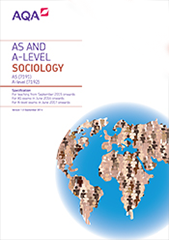3.1 Education with Methods in Context
The study of the topics in this paper should engage students in theoretical debate while encouraging an active involvement with the research process.
The study should foster a critical awareness of contemporary social processes and change, and draw together the knowledge, understanding and skills learnt in different aspects of the course.
In their study of the topics, students should examine:
- topic areas in relation to the two core themes (socialisation, culture and identity; and social differentiation, power and stratification)
- both the evidence of and the sociological explanations for the content listed in the topic areas below.
Throughout, students should be encouraged to use examples drawn from their own experience of small-scale research.
Attention should be given to drawing out links with other topics studied in this specification.
Education
Students are expected to be familiar with sociological explanations of the following content:
- the role and functions of the education system, including its relationship to the economy and to class structure
- differential educational achievement of social groups by social class, gender and ethnicity in contemporary society
- relationships and processes within schools, with particular reference to teacher/pupil relationships, pupil identities and subcultures, the hidden curriculum, and the organisation of teaching and learning
- the significance of educational policies, including policies of selection, marketisation and privatisation, and policies to achieve greater equality of opportunity or outcome, for an understanding of the structure, role, impact and experience of and access to education; the impact of globalisation on educational policy.
Methods in Context
Students must be able to apply sociological research methods to the study of education.
